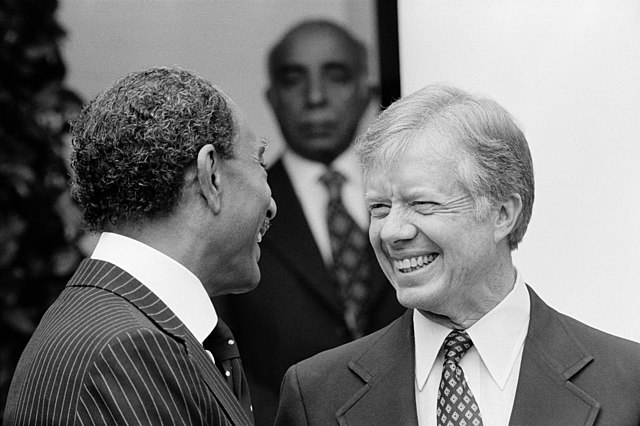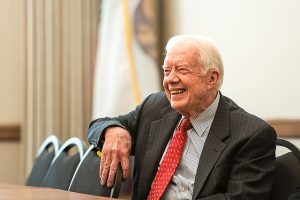Jimmy Carter’s political career deserves more credit
President Jimmy Carter welcomes Egyptian President Anwar Sadat at the White House on April 8, 1980. Two years earlier, Sadat signed the Camp David Accords treaty.
April 28, 2023
Former president Jimmy Carter’s political career was heavily criticized, however, the impact he made across the world was tremendous. For his work that exceeded expectations, Carter deserves more respect and should be a role model for today’s politicians.
Carter rose from humble beginnings. He was born into a peanut farming family in Plains, Georgia on Oct. 1, 1924 and married Rosalynn Carter in 1946. That same year at the age of 22, Carter graduated from the United States Naval Academy and entered the submarine service, serving as lieutenant and working in the nuclear submarine program. He kick started his political career by offering his life to the United States, proof of his dedication, before returning home.
Despite living in the deep south, Carter firmly remained progressive from a young age and refused to be swayed by the opinions of other people. When Brown v. The Board of Education established segregation to be unconstitutional and the civil rights movement began to grow, white opposition steadily increased, including in Plains, Georgia. The White Citizens Council was created to uphold segregation. Every white male in Plains joined, except for Carter, who refused to join even after his products were boycotted.
His progressiveness didn’t stop at just tolerance of the civil rights movement either. During Carter’s inaugural address, when he became governor in 1971, Carter advocated for desegregation along with a more efficient bureaucracy and environmental protection and sustainability, shocking many Georgians with his progressiveness and making national news.
Unlike many politicians then and even now, Carter was very forward with his beliefs. Oftentimes this led to conflict with Congress, however he always tried to do what he believed to be correct. While compromise is important, it should not come at the expense of losing one’s opinions, especially when voting on key issues. Politicians are elected because of their beliefs and experiences. In order to properly represent their constituents, they need to adhere to their opinions, like Carter did.
Carter began running for president in 1974 and was elected on Nov. 2, 1976. Throughout his presidency, he created several new departments including the Department of Energy and the Department of Education.
He also helped solve important foreign affairs issues, such as the Hostage Crisis in Iran of 1979, where he made great strides in freeing the hostage American embassy members. At the same time, Carter improved relations with other countries. The Camp David Accords created a new standard of presidential negotiation and established diplomatic relations between Israel and Egypt after decades of war and heightened tensions.
As if his incredible work in foreign affairs and human rights protection wasn’t enough, Carter was also an early supporter of environmental protection and sustainable energy. He opposed large government water projects that would harm the environment, despite many of these projects being supported by his own party, again showcasing his independence.
After his presidency, Instead of just settling down and comfortably living off the money he had, Carter continued to live modestly; living in his old house, writing books and even flying commercially instead of privately. This is a stark contrast to many other presidents who live extravagantly after their terms, obsessed with power, money and fame. Wealth was never a goal for Carter and this fact makes his presidency and beliefs even more genuine. In 1982, Carter established the Carter Center, an organization dedicated to upholding Carter’s values. Since its establishment, the Carter Center has reached over 25 countries, resolving conflicts, protecting democracy, eradicating diseases and protecting human rights.
For all of his efforts and just character, Carter received the Presidential Medal of Freedom in 1999 and the Nobel Peace Prize in 2002 along with countless other awards.
Throughout his entire life, Carter pushed with all his might for what he believed in, despite resistance from so many people. Many consider his presidency to be a failure, however he is vastly misunderstood. Carter accomplished so much all over the world. As a veteran, teacher, leader and so much more, he dedicated his entire life to serving the United States as well as countries and people all around the world. Carter’s honesty, bravery, determination and humbleness needs to be studied by today’s politicians so that his legacy can be continued on.








